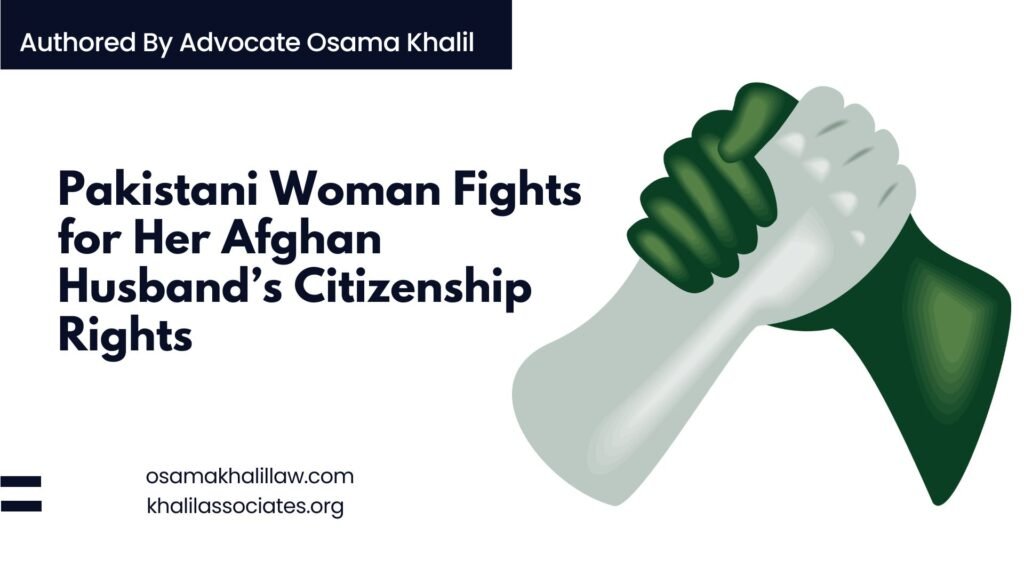
In a landmark judgment where Pakistani woman foreign husband citizenship rights were involved, the Peshawar High Court ruled in favor of a Pakistani woman, Mst. Amna, who fought for her Afghan husband’s right to obtain a Pakistan Origin Card (POC). The case, PLD 2024 Peshawar 57, highlights the ongoing struggle against gender discrimination in Pakistan’s citizenship laws. The court reinforced that denying a Pakistani woman the right to secure citizenship for her foreign husband violates constitutional guarantees of equality.
Background of the Case
Mst. Amna, a Pakistani citizen, married Najibullah, an Afghan refugee, in 2018. They have two children together. When she applied for her husband’s Pakistan Origin Card (POC), authorities rejected the request, citing Section 10(2) of the Pakistan Citizenship Act, 1951. This law allows a Pakistani man to grant citizenship to his foreign wife but denies the same right to a Pakistani woman married to a foreign man.
The Legal Battle Against Gender Discrimination – Pakistani woman foreign husband citizenship rights
The petitioners argued that Section 10(2) of the Pakistan Citizenship Act, 1951 is discriminatory. They referenced previous judgments, including:
PLD 2008 FSC 1 (Suo Motu Gender Equality Case) – The Federal Shariat Court declared Section 10(2) against Islamic principles and constitutional equality.
PLD 2016 Lahore 857 (Mst. Rukhsana Bibi Case) – The Lahore High Court ruled that denying citizenship to foreign husbands violates Article 25 (Equality) and Article 2-A (Islamic Provisions) of the Constitution.
Court’s Decision in PLD 2024 Peshawar 57
The Peshawar High Court, following earlier precedents, held that:
Gender discrimination in citizenship laws is unconstitutional.
Pakistani women must have equal rights to sponsor their foreign husbands.
The government must process POC applications for foreign husbands fairly.
The court directed the Ministry of Interior and NADRA to reconsider Najibullah’s case for a Pakistan Origin Card (POC) under the law.
Why This Judgment Matters for Pakistani Women – Pakistani woman foreign husband citizenship rights
This case sets a strong precedent for gender equality in citizenship laws Pakistan. Many Pakistani women married to foreigners, especially Afghan refugees, face legal hurdles. The judgment ensures that:
Pakistani women can legally fight for their husbands’ residency rights.
Authorities cannot deny POC applications based on gender bias.
Future cases will follow this ruling to uphold constitutional rights.
Challenges in Implementing the Judgment
Despite the court’s decision, challenges remain:
Bureaucratic delays – Many women still struggle with slow processing.
Lack of awareness – Most women don’t know their legal rights.
Resistance from authorities – Some officials still resist granting POCs to foreign husbands.
What Should Affected Women Do Now?
If you are a Pakistani woman married to a foreigner, follow these steps:
File a formal application for a Pakistan Origin Card (POC) with NADRA.
Cite PLD 2024 Peshawar 57 in your application to strengthen your case.
Seek legal help if authorities reject your request unfairly.
Conclusion
The PLD 2024 Peshawar 57 judgment is a victory for gender equality in citizenship laws Pakistan. It reaffirms that Pakistani women have the same rights as men when it comes to securing residency for their spouses. While challenges remain, this ruling paves the way for fairer treatment of Pakistani women married to foreigners.
If you or someone you know is fighting a similar battle, understanding this case can help secure justice. The courts have spoken – discrimination in citizenship laws must end now!
Legal Assistance
For professional legal guidance and support in immigration matters, you may contact:
Mr. Osama Khalil
Lawyer & Legal Consultant
📞 Phone: 0316-1829946
📧 Email: contact@osamakhalillaw.com | contact@khalilassociates.org
